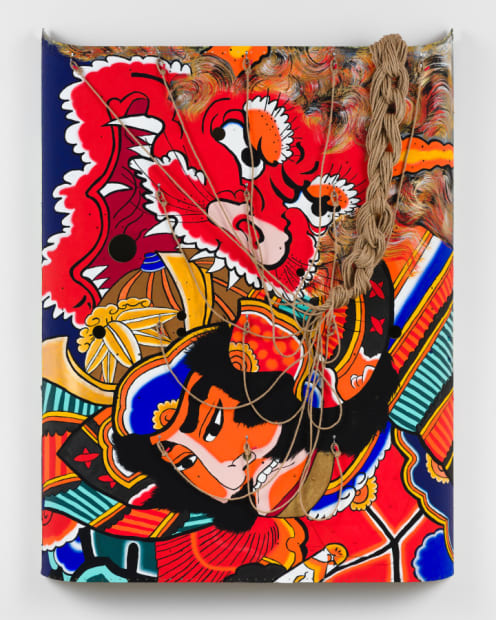-
Sulman Prize.
-

-
Raiko & Shuten Douji.
This is our rendering of the fight between the warrior Raiko and the demon Shuten-dōji. The warrior fools the demon through tricking him with his many helmets. The Japanese folk design is usually painted on kites but we have painted this scene on the fuselage of a Vietnam War-era helicopter.
One of the ideas we were thinking about while painting was the militarisation of objects of spectacle: fireworks to bullets, kites to warplanes, social media to insurrection. Why is it that objects of wonderment become the means of our own subjugation? It seems that we are the ones being bamboozled.
-
Archibald Prize.
-

-
You were my biggest regret: diary entry 1806.
Joan Ross is known for her interdisciplinary practice that confronts Australia’s colonial legacy. In this portrait, she has painted herself as a colonial woman holding the stump of a tree with a deep tenderness, like a lover.
‘There is regret in my eyes as I look back through time, thinking about the damage caused through colonisation,’ says Ross.
‘Behind me is a watercolour of Castle Hill from 1802. My portrait fuses with this historical picture of colonisation. She sees, and we see, that she is a part of it, part of the greed and all the sadness and destruction colonisation has caused.
Trees have been on earth for approximately 400 million years. 'As a child seeing a tree cut down, I would imagine all the insects and spiders and birds living in them. I wondered where they would go, I envisaged them trudging along in a long line looking for a new home.’
Born in Scotland and based in Sydney, Ross was a finalist in the 2021 Archibald. She won the 2017 Sulman and was the judge for this year’s Prize.
-

-
Dear Brett (The Blue Room).
In this self-portrait, Natasha Walsh celebrates the inner workings of the artist’s studio, while also subverting the historically limiting place of women within this space.
‘Referencing Brett Whiteley’s 1976 Archibald-winning work Self-portrait in the studio, I have repositioned the nude from the bottom left-hand corner, where she lay inert, to hold the active position of an artist painting her own nude representation through mirrors. The viewer adopts her perspective as the artist and subject, her outstretched hands becoming our own as she paints her work, The gaze,’ says Walsh.
The portrait also references the work of Japanese artist Hokusai along with the artists he inspired – Vincent van Gogh and Henri Matisse – who, in turn, inspired Whiteley and Walsh herself. It is painted on copper, and the variations in colour are determined by the reactions of different pigments to the oxidisation process.
Walsh won the 2018 Brett Whiteley Travelling Art Scholarship at the age of 24. This is her fifth time in the Archibald Prize.
-
Wynne Prize.
-

-
Home.
This painting is of a site in the Old Telegraph Station in Mparntwe (Alice Springs), and takes the Western figurative landscape tradition and imbues it with the personal and spiritual associations of Country.
This place has a complex history and is the nexus for my own life-long journey deepening my connection with my culture. This body of work came about during lockdown, being unable to travel there I felt a longing for country. I will always return to this subject, just like I will always return to country.
This current series started during the bushfires and has continued through the floods - I think it was a way of processing my fears and grief. Country is our home - we must protect it.



